- Home >
- Product >
- Excavator >
- Mini Excavator >
- View Details
ZX-35 Compact Excavator high-performance
Mini excavators can be fitted with a variety of attachments, like hydraulic hammers, thumbs, and trenchers, broadening their utility beyond traditional excavation.
- ZX-35
- ZHUOXIN
- shandong.china
- TT, Paypal, Credit card, Western union
- +86-15163766288
- This introduction is crafted to provide a comprehensive understanding of mini excavators, focusing on their unique design, multifunctional capabilities, and the diverse applications they cater to in various industries.
Description

Mini excavators, the compact variants in the excavator family, are a game-changer in the construction and excavation world. Renowned for their small size and robust performance, they are the go-to equipment for projects requiring precision and agility.
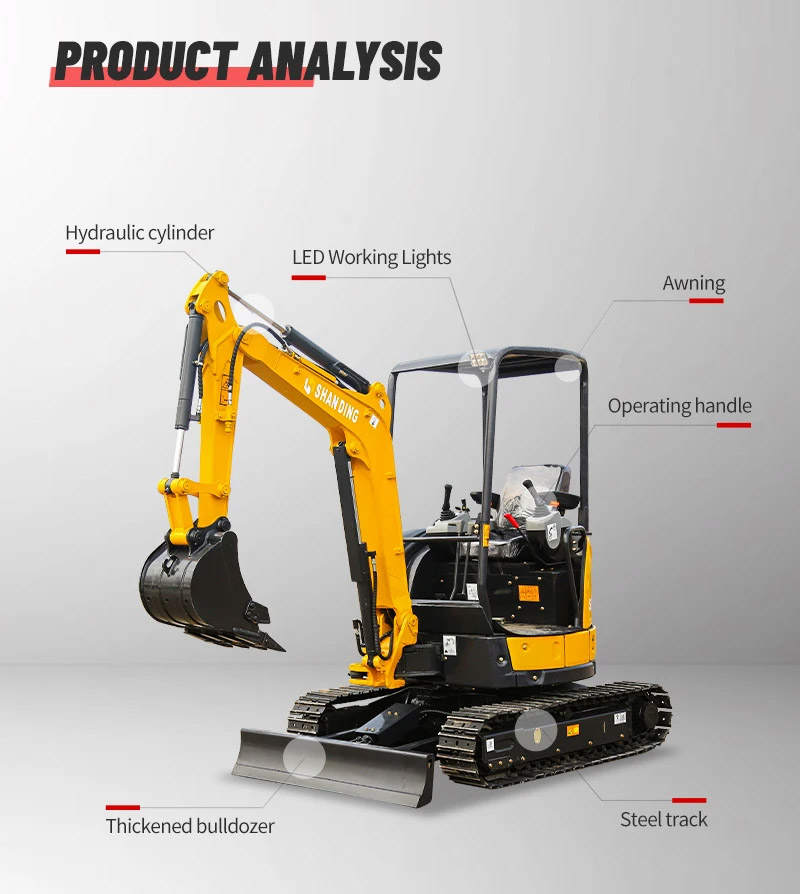
Hydraulic Systems: These are the heart of the excavator, providing the power needed for digging and lifting.
Boom, Arm, and Bucket: The standard configuration includes a boom (the main arm), a dipper or stick (the secondary arm), and a bucket.
360-Degree Rotation: The upper structure (cab, engine, counterweight) can rotate 360 degrees, allowing for flexibility in movement and operation.
Tracks or Wheels: While most models have tracks for stability and off-road capability, some are equipped with wheels for faster movement on paved surfaces.
Compact Size: Their small footprint makes them ideal for urban construction sites and indoor applications.
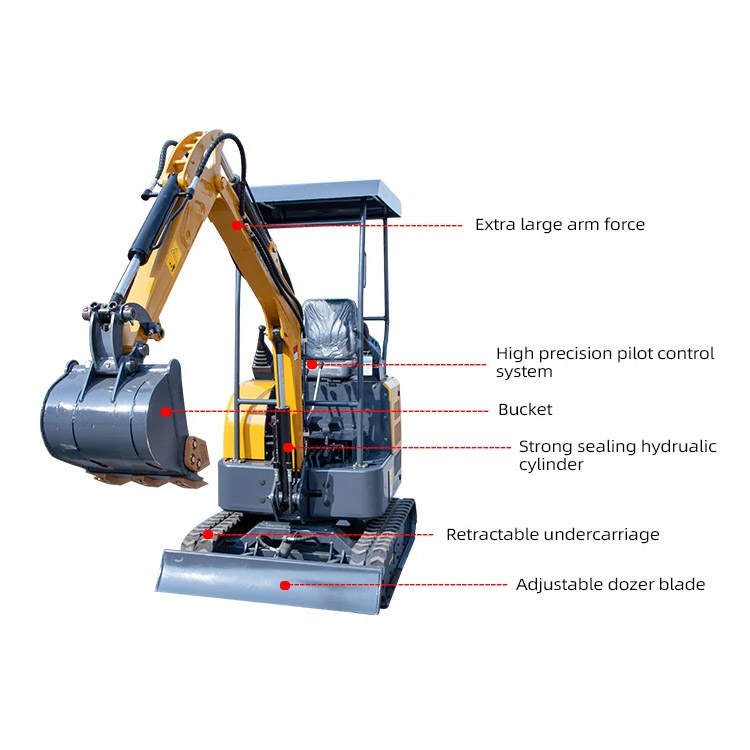
Construction: For tasks such as digging foundations, trenching, and demolition.Landscaping: Ideal for tree planting, creating ponds, and general garden shaping.Utility Work: Useful in laying pipes, electrical cables, and sewer lines.Mining: Small-scale excavation and material handling.
Advantages The benefits of using a compact excavator include:
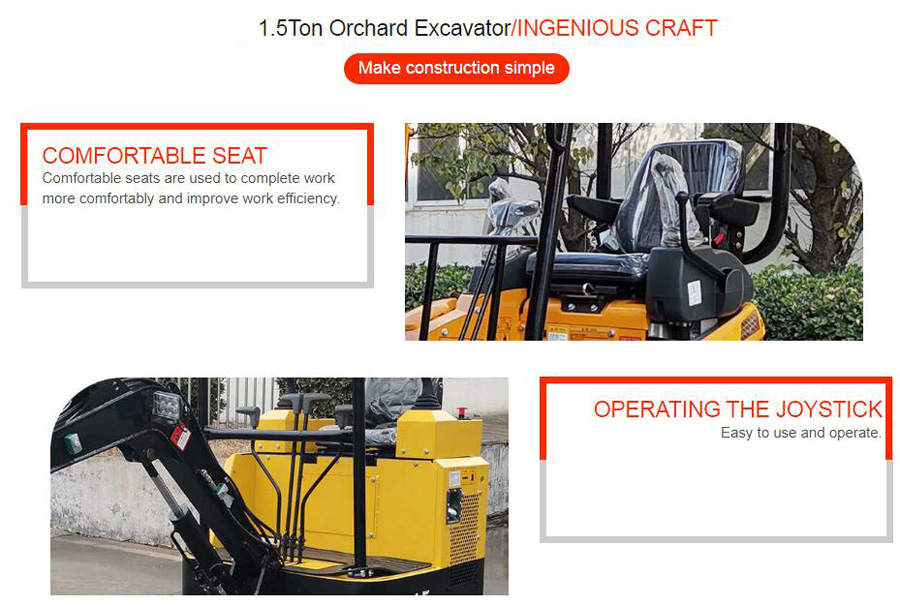
Accessibility: Can operate in confined areas, reducing the need for manual labor.Versatility: A wide range of attachments (hammers, augers, grapples) enhances its utility.
Reduced Operational Costs: Lower fuel consumption compared to larger machines.Ease of Transportation: Can be easily transported on a trailer or light truck.
Safety and Maintenance
Safety is paramount when operating any heavy machinery. Compact excavators come equipped with safety features like ROPS (Roll-Over Protection Structure), automatic shutoff, and cameras for better visibility. Regular maintenance, including checks on hydraulics, engine oil, and track tension, is crucial for optimal performance and longevity.
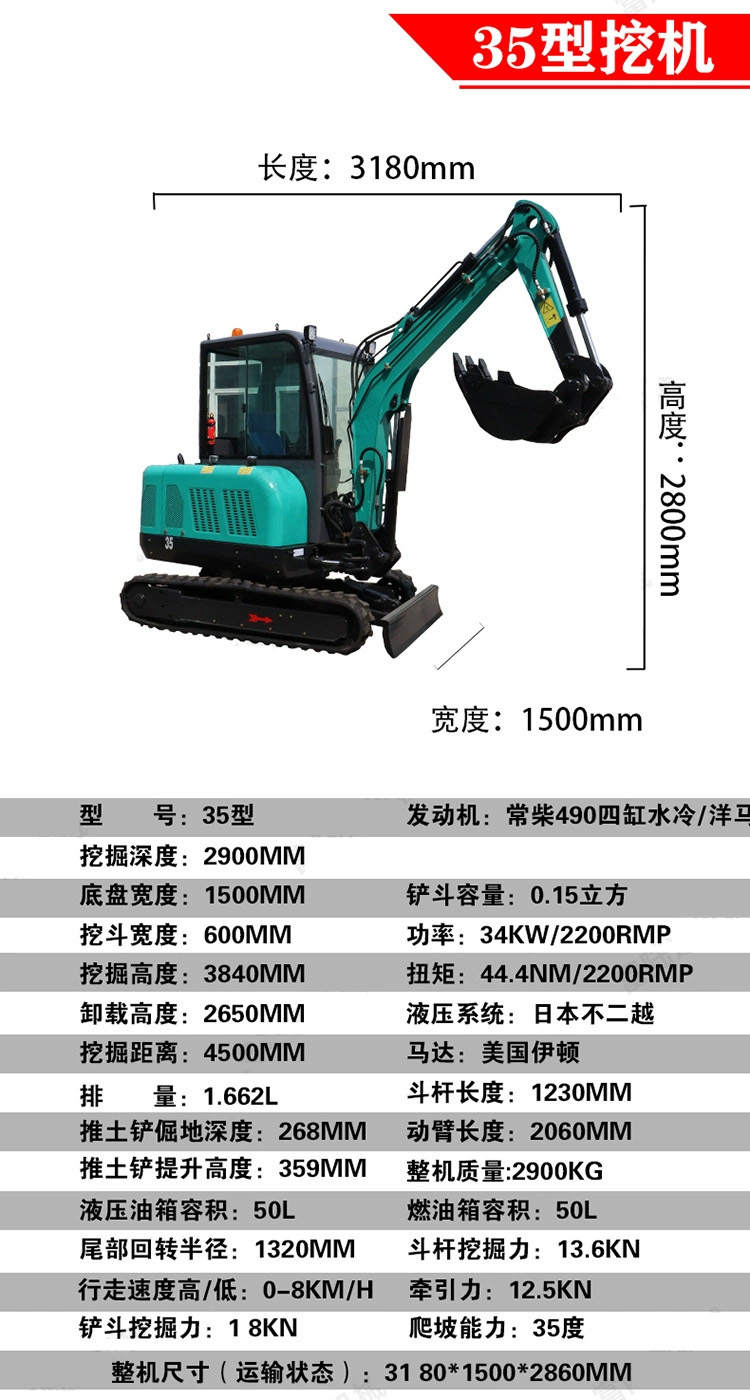
Lower Operational Costs: They are more fuel-efficient and incur lower maintenance costs.Ease of Use: Their intuitive controls and smaller size make them easier to operate, especially for less experienced operators.Reduced Environmental Impact: Less ground disturbance and lower noise levels make them suitable for sensitive environments.
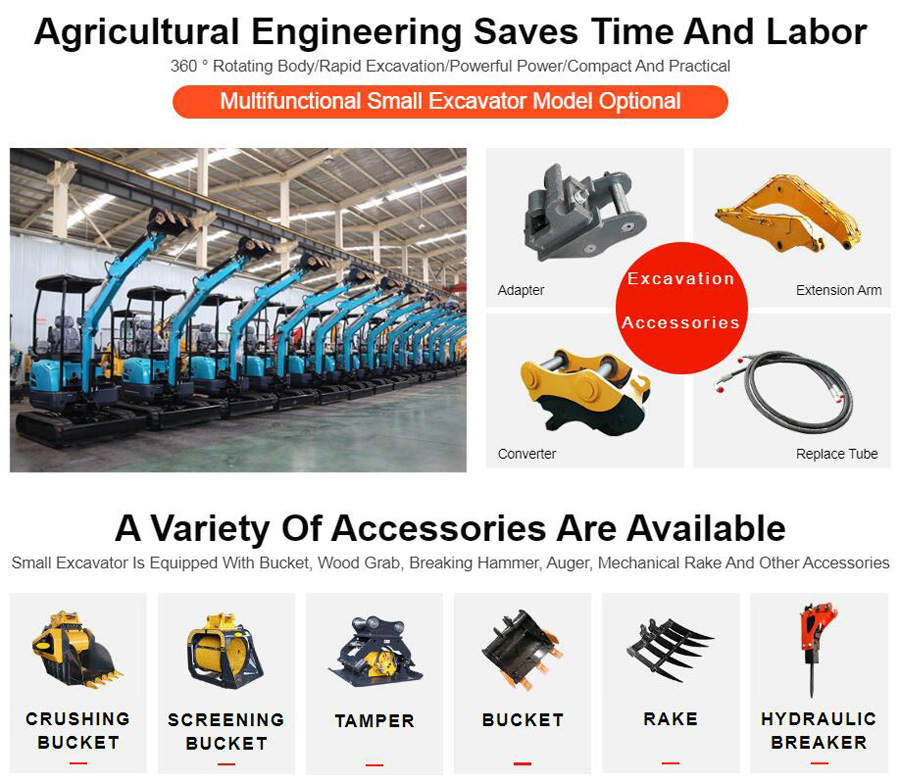
Exceptional Maneuverability: Their compact design allows easy navigation in tight spaces, enhancing site accessibility.Economic Efficiency: With lower operational and maintenance costs, they are a cost-effective solution for many projects.Easy Transportation: Their lightweight nature simplifies transportation, allowing them to be easily moved between sites.
Digging and Excavation: With various bucket sizes, small excavators are adept at digging for foundations, trenches, and landscaping projects.
Material Handling: They can lift and move materials like soil, gravel, and debris with ease.
Demolition: Mini excavators can be equipped with hydraulic breakers or hammers for light demolition tasks.
Utility Work: Their precision makes them ideal for plumbing, electrical, and other utility installations.
Attachments and Customization:
Small excavators offer a range of attachments, such as augers for drilling, grapples for material handling, and compactors for soil compaction. This versatility allows one machine to perform various tasks, enhancing its utility on a job site.
Applications:
These machines are used in urban construction, landscaping, agriculture, and utility installations. Their small size allows for operation in tight spaces, such as indoor areas or crowded urban sites.
Advantages:
Maneuverability: Their compact size allows for easy navigation in confined spaces.
Reduced Operating Costs: Smaller engines and efficient design lead to lower fuel consumption and maintenance costs.
Ease of Transportation: Being lightweight, they can be transported on smaller trailers, reducing logistical challenges.
Conclusion:
Small excavators are a dynamic and essential tool in the modern construction and landscaping industries. Their versatility, efficiency, and ease of use make them a preferred choice for a wide range of tasks, proving that great things indeed come in small packages.
This introduction aims to provide a comprehensive overview of small excavators, highlighting their design, features, capabilities, and applications in various industries.

Hydraulic Systems: These are the heart of the excavator, providing the power needed for digging and lifting.
Boom, Arm, and Bucket: The standard configuration includes a boom (the main arm), a dipper or stick (the secondary arm), and a bucket.
360-Degree Rotation: The upper structure (cab, engine, counterweight) can rotate 360 degrees, allowing for flexibility in movement and operation.
Tracks or Wheels: While most models have tracks for stability and off-road capability, some are equipped with wheels for faster movement on paved surfaces.
Compact Size: Their small footprint makes them ideal for urban construction sites and indoor applications.

Construction: For tasks such as digging foundations, trenching, and demolition.Landscaping: Ideal for tree planting, creating ponds, and general garden shaping.Utility Work: Useful in laying pipes, electrical cables, and sewer lines.Mining: Small-scale excavation and material handling.
Advantages The benefits of using a compact excavator include:

Accessibility: Can operate in confined areas, reducing the need for manual labor.Versatility: A wide range of attachments (hammers, augers, grapples) enhances its utility.
Reduced Operational Costs: Lower fuel consumption compared to larger machines.Ease of Transportation: Can be easily transported on a trailer or light truck.
Safety and Maintenance
Safety is paramount when operating any heavy machinery. Compact excavators come equipped with safety features like ROPS (Roll-Over Protection Structure), automatic shutoff, and cameras for better visibility. Regular maintenance, including checks on hydraulics, engine oil, and track tension, is crucial for optimal performance and longevity.

Lower Operational Costs: They are more fuel-efficient and incur lower maintenance costs.Ease of Use: Their intuitive controls and smaller size make them easier to operate, especially for less experienced operators.Reduced Environmental Impact: Less ground disturbance and lower noise levels make them suitable for sensitive environments.

Exceptional Maneuverability: Their compact design allows easy navigation in tight spaces, enhancing site accessibility.Economic Efficiency: With lower operational and maintenance costs, they are a cost-effective solution for many projects.Easy Transportation: Their lightweight nature simplifies transportation, allowing them to be easily moved between sites.
Digging and Excavation: With various bucket sizes, small excavators are adept at digging for foundations, trenches, and landscaping projects.
Material Handling: They can lift and move materials like soil, gravel, and debris with ease.
Demolition: Mini excavators can be equipped with hydraulic breakers or hammers for light demolition tasks.
Utility Work: Their precision makes them ideal for plumbing, electrical, and other utility installations.
Attachments and Customization:
Small excavators offer a range of attachments, such as augers for drilling, grapples for material handling, and compactors for soil compaction. This versatility allows one machine to perform various tasks, enhancing its utility on a job site.
Applications:
These machines are used in urban construction, landscaping, agriculture, and utility installations. Their small size allows for operation in tight spaces, such as indoor areas or crowded urban sites.
Advantages:
Maneuverability: Their compact size allows for easy navigation in confined spaces.
Reduced Operating Costs: Smaller engines and efficient design lead to lower fuel consumption and maintenance costs.
Ease of Transportation: Being lightweight, they can be transported on smaller trailers, reducing logistical challenges.
Conclusion:
Small excavators are a dynamic and essential tool in the modern construction and landscaping industries. Their versatility, efficiency, and ease of use make them a preferred choice for a wide range of tasks, proving that great things indeed come in small packages.
This introduction aims to provide a comprehensive overview of small excavators, highlighting their design, features, capabilities, and applications in various industries.
Tags
Get the latest price? We'll respond as soon as possible(within 12 hours)























